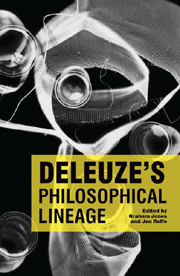Book contents
- Frontmatter
- Contents
- Acknowledgements
- List of Abbreviations
- Introduction: Into the Labyrinth
- 1 Plato
- 2 John Duns Scotus
- 3 G. W. F. Leibniz
- 4 David Hume
- 5 Immanuel Kant
- 6 Solomon Maimon
- 7 G. W. F. Hegel
- 8 Karl Marx
- 9 Hoëne Wronski and Francis Warrain
- 10 Bernhard Riemann
- 11 Gabriel Tarde
- 12 Sigmund Freud
- 13 Henri Bergson
- 14 Edmund Husserl
- 15 A. N. Whitehead
- 16 Raymond Ruyer
- 17 Martin Heidegger
- 18 Pierre Klossowski
- 19 Albert Lautman
- 20 Gilbert Simondon
- Bibliography
- Notes on Contributors
- Index
9 - Hoëne Wronski and Francis Warrain
Published online by Cambridge University Press: 12 September 2012
- Frontmatter
- Contents
- Acknowledgements
- List of Abbreviations
- Introduction: Into the Labyrinth
- 1 Plato
- 2 John Duns Scotus
- 3 G. W. F. Leibniz
- 4 David Hume
- 5 Immanuel Kant
- 6 Solomon Maimon
- 7 G. W. F. Hegel
- 8 Karl Marx
- 9 Hoëne Wronski and Francis Warrain
- 10 Bernhard Riemann
- 11 Gabriel Tarde
- 12 Sigmund Freud
- 13 Henri Bergson
- 14 Edmund Husserl
- 15 A. N. Whitehead
- 16 Raymond Ruyer
- 17 Martin Heidegger
- 18 Pierre Klossowski
- 19 Albert Lautman
- 20 Gilbert Simondon
- Bibliography
- Notes on Contributors
- Index
Summary
At least up until the publication of Difference and Repetition in 1968, Deleuze could with accuracy be described as a proponent of ‘the philosophy of difference’. In the notoriously dense fourth chapter of Difference and Repetition, ‘The Ideal Synthesis of Difference’, Deleuze develops at length the thought that differential calculus can serve as the universal formal instrument for the theory and practice of ‘differentiation’. Deleuze argues that differential calculus offers a formal clue to a possible ‘dialectic of problems’ which can replace the Hegelian dialectic of the Concept. ‘Just as we oppose difference in itself to negativity, so we oppose dx to not-A, the symbol of difference (Differenzphilosophie) to that of contradiction’ (DR 170). Since Deleuze's philosophy of difference rests in part on his development of models from differential calculus, the question of the precise meaning and use he ascribes to the calculus is an important one. ‘A great deal of heart and a great deal of truly philosophical naivety is needed in order to take the symbol dx seriously’, says Deleuze, looking us in the eye, at the outset of his discussion of the calculus in Difference and Repetition. ‘For their part, Kant and even Leibniz renounced the idea’ (DR 170). But why exactly must a philosopher be naive to take the differential calculus seriously as an instrument of the philosophy of difference?
In the introduction to the discussion of the calculus in Difference and Repetition, Deleuze announces that he specifically wishes to focus on an ‘esoteric history of differential philosophy’, in which ‘three names shine forth like bright stars … Salomon Maïmon, Hoëne Wronski and Jean Bordas-Desmoulin’.
- Type
- Chapter
- Information
- Deleuze's Philosophical Lineage , pp. 167 - 189Publisher: Edinburgh University PressPrint publication year: 2009



